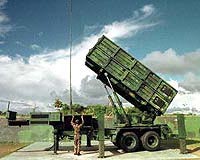| . |  |
. |
Washington (AFP) Feb 1, 2010 After a year of wooing China, President Barack Obama is showing a new side by brazenly defying the rising Asian power -- while hoping that the rift will be temporary. The Obama administration on Friday signed off on a 6.4 billion-dollar arms package for Taiwan. China, which claims the island, had repeatedly warned against the sale and retaliated by vowing to punish US companies. Obama could butt heads with Beijing again in the coming weeks if he meets the Dalai Lama. The two nations also have a number of trade rows including Google's threat to leave China over hacking of activists' email accounts. Officials and experts doubted that Obama was seeking to antagonize China. Rather, they said he had long planned to sell arms to Taiwan and meet the Dalai Lama but wanted first to develop a good rapport with Beijing. Douglas H. Paal, a former top US policymaker on China and envoy to Taiwan, said Obama had waited for the right time and saw a window after Beijing balked in mid-January at backing tougher sanctions against Iran. "It became clear that Beijing was not going to play on Iran and therefore there was nothing to hold up the arms sales anymore," said Paal, vice president for studies at the Carnegie Endowment for International Peace. Obama opened his administration pledging to expand cooperation between the world's largest developed and developing nations, eying cooperation on issues from climate change to reviving the global economy to North Korea. But Obama came back on the defensive after a trip in November to China which made no visible goodwill gestures to him, not freeing any dissidents or even broadcasting nationally his one public forum. A month earlier, Obama had avoided meeting the Dalai Lama when he was in Washington so as not to sour the president's trip. China accuses the Dalai Lama of separatism, although the monk says he is seeking greater rights for Tibet under Chinese rule. The White House indicated last year that Obama would meet the Dalai Lama at a later date. The Dalai Lama is due in the United States this month, starting with a public lecture on February 21 in Los Angeles. Walter Lohman, director of the Asian Studies Center at the Heritage Foundation, a conservative think-tank, said it would be impossible politically for Obama to avoid the Tibetan leader again. "It's the Chinese who are the real outliers here. They're the only people in the world who have a negative impression of the Dalai Lama," Lohman said. "The real problem here was giving an impression to the Chinese that there was some possibility that the US was going to listen to them on the Dalai Lama," he said, criticizing Obama for being "excessively deferential" to China. China was largely positive about previous president George W. Bush. During his eight-year presidency, China's exports and investments in the United States soared; China now holds more than 800 billion dollars of the ballooning US debt. While questioning the amount of leverage China has, Lohman said: "I think they know the perception is out there that they have this leverage and are the new boss in town, and so they're playing off that." But Nina Hachigian, a senior fellow at the left-leaning Center for American Progress, dismissed suggestions that Obama had been weak on China, saying the new administration had set out a path to work together on common interests. "While it was not a reason for it, I do think the arms package should quell the ridiculous judgments that Obama was being too deferential to China," she said. "I do think they've been successful, even though there is still a lot of distrust, in reassuring that we welcome a rising China and we don't want to contain China," she said. She said that the United States and China were in a "Bermuda triangle stage" of relations with Taiwan, Tibet and trade issues. "That's going to mean rough sailing in the relationship for a while, but the fact is we're in this together," she said. "It's in neither side's interest for it to get derailed, so after a certain period it will get back on track."
Share This Article With Planet Earth
Related Links Learn about the Superpowers of the 21st Century at SpaceWar.com Learn about nuclear weapons doctrine and defense at SpaceWar.com
 China may hamper US diplomacy over Taiwan arms sale: experts
China may hamper US diplomacy over Taiwan arms sale: expertsBeijing (AFP) Feb 1, 2010 China could block new UN sanctions on Iran and hinder progress on other key areas of international diplomacy such as North Korea in retaliation for US weapons sales to Taiwan, analysts said Monday. With China-US ties already strained and a dispute over Google ongoing, a threat by Beijing to punish US firms involved in the 6.4-billion-dollar deal with Taipei shows it feels empowered to stand ... read more |
|
| The content herein, unless otherwise known to be public domain, are Copyright 1995-2010 - SpaceDaily. AFP and UPI Wire Stories are copyright Agence France-Presse and United Press International. ESA Portal Reports are copyright European Space Agency. All NASA sourced material is public domain. Additional copyrights may apply in whole or part to other bona fide parties. Advertising does not imply endorsement,agreement or approval of any opinions, statements or information provided by SpaceDaily on any Web page published or hosted by SpaceDaily. Privacy Statement |